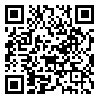دوره 9، شماره 3 - ( 2-1403 )
جلد 9 شماره 3 صفحات 220-211 |
برگشت به فهرست نسخه ها
Download citation:
BibTeX | RIS | EndNote | Medlars | ProCite | Reference Manager | RefWorks
Send citation to:



BibTeX | RIS | EndNote | Medlars | ProCite | Reference Manager | RefWorks
Send citation to:
Torabi M, Borhani F, Abbaszadeh A, Oshvandi K, Khazaie S, Masoumi H. Investigating the Relationship Between Moral Distress and Ethical Climate Among Emergency Medical Services Personnel. Health in Emergencies and Disasters Quarterly 2024; 9 (3) :211-220
URL: http://hdq.uswr.ac.ir/article-1-562-fa.html
URL: http://hdq.uswr.ac.ir/article-1-562-fa.html
Investigating the Relationship Between Moral Distress and Ethical Climate Among Emergency Medical Services Personnel. فصلنامه سلامت در حوادث و بلایا. 1403; 9 (3) :211-220
چکیده: (3528 مشاهده)
Background: Due to the nature of their work, prehospital personnel face various ethical challenges that can lead to moral distress. Compared to hospital nurses, the interaction of personnel in the pre-hospital environment is closer, and the ethical climate can affect the reaction of pre-hospital personnel in the face of moral challenges and distress. This study determines the relationship between moral distress and ethical climate among prehospital personnel.
Materials and Methods: This cross-sectional correlational study was conducted on 136 emergency medical services personnel selected via census sampling. To collect the data, two instruments were used, namely the revised moral distress and Victor and Cullen’s standard ethical climate. The data were analyzed using descriptive statistics and Pearson correlation in the SPSS software, version 23.
Results: According to the results, the mean score of moral distress intensity (MDI) was high (3.65±1.14) and the mean score of moral distress frequency (MDF) was moderate (1.83±0.53) among emergency medical services personnel. The mean ethical climate was moderate (2.96±1.02). The study found a negative and significant relationship between ethical climate and MDI among emergency medical services staff (r=-0.34, P<0.05). However, there was no significant relationship between ethical climate and MDF (r=-0.11, P>0.05). This study also found a significant relationship between MDI and personal characteristics, such as age, work experience, and history of referral to the board of inquiry (P<0.05). Additionally, there was a significant relationship between MDF and work experience (P<0.05). However, no significant relationship was detected between demographic factors and ethical climate (P>0.05).
Conclusion: Considering the positive effect of the ethical climate on reducing emergency medical services providers’ moral distress, more attention is essential to the factors affecting moral distress.
Materials and Methods: This cross-sectional correlational study was conducted on 136 emergency medical services personnel selected via census sampling. To collect the data, two instruments were used, namely the revised moral distress and Victor and Cullen’s standard ethical climate. The data were analyzed using descriptive statistics and Pearson correlation in the SPSS software, version 23.
Results: According to the results, the mean score of moral distress intensity (MDI) was high (3.65±1.14) and the mean score of moral distress frequency (MDF) was moderate (1.83±0.53) among emergency medical services personnel. The mean ethical climate was moderate (2.96±1.02). The study found a negative and significant relationship between ethical climate and MDI among emergency medical services staff (r=-0.34, P<0.05). However, there was no significant relationship between ethical climate and MDF (r=-0.11, P>0.05). This study also found a significant relationship between MDI and personal characteristics, such as age, work experience, and history of referral to the board of inquiry (P<0.05). Additionally, there was a significant relationship between MDF and work experience (P<0.05). However, no significant relationship was detected between demographic factors and ethical climate (P>0.05).
Conclusion: Considering the positive effect of the ethical climate on reducing emergency medical services providers’ moral distress, more attention is essential to the factors affecting moral distress.
| بازنشر اطلاعات | |
 |
این مقاله تحت شرایط Creative Commons Attribution-NonCommercial 4.0 International License قابل بازنشر است. |





